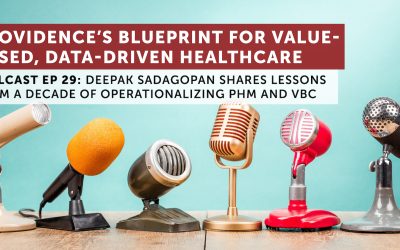Two themes in this week’s #WWBR: primary research and MU. We have a few good studies published in peer-reviewed journals looking at changes in healthcare delivery models and how to improve outcomes with real evidence-based practices (mostly involving more engagement and outreach). And then in response to MU announcements, we have some good reaction pieces. Enjoy, and have a fantastic weekend! – John 3
Analytics Outweighs Accountable Care, Population Health, ICD-10 as an IT Priority, say Health System Execs
via PRNewswire
“Study conducted this summer of healthcare IT executives by Health Catalyst and CHIME that found that a slight majority (54 percent) of respondents rated analytics as their highest IT priority, followed by investments in population health initiatives (42 percent), ICD-10 (30 percent), accountable care/shared risk initiatives (29 percent), and consolidation-related investments (11 percent). No real surprises although there does still seem to be a reluctance on providers behalf to fully commit to a platform solution with a large upfront investment.” – Matt
The “pay less, get more” era of health care
Sarah Kliff in Vox
“Getting more healthcare for less money is a new and radical idea. But the data is increasingly supportive that this may be what is happening. Actuaries, more colloquially known as oddsmakers, are forecasting moderation in the growth of healthcare costs. This article has the charts and graphs to show how this trend is playing out. How long these trends last is, of course, a topic of speculation.” – Brian
Navigating The Reality Of Cloud, Mobile And SaaS
Guy Turner in TechCrunch
“A VC partner provides some insight in to how they look at investment opportunities and where the gaps are. Breaking away from “group think” is critical.” – John
“Shock,” “Dismay,” and Stage 2 of Meaningful Use
Jeff Smith in Healthcare Informatics
“It is not a big surprise to anyone that CIOs are not happy with the final rule recently issued for MU. Their worries are driven by some of the specific provisions outlined here. Attestation has been incredibly low (less than 4% of hospitals, less than 2% of providers) this year. Is this data suggesting that HCOs might opt to skip playing this game altogether in years to come? If so – are they going to sit back on their laurels with regards to HIT, or simply forge ahead above/beyond MU requirements?” – Naveen
Ambulatory Providers Grow Less Confident in Stage 3, Study Finds
In iHealthBeat
“Recent study by HIMSS done on ambulatory providers (free-standing and hospital-affiliated). The number that jumps out is the low attestation rates for Stage 2 to date despite it being the focal point of attention for these providers. Only 25% of these providers think they will eventually successfully attest for Stage 3 too. Given that number is certainly optimistic too, it is likely pressure is going to mount for their being a significant revamp of Stage 3 if not a complete redo of the program.” – Matt
Is audit and feedback associated with increased hospital adherence to standards for communication during patient care transitions?
Rosa Baier, et al., in The Journal Of Hospital Administration
“Better information flow helps reduce readmissions. This article shows the effect of really simple, stripped-down communications on readmissions rates. When PCPs get timely ADT notices, a discharge summary, contact information for access to hospital records, and schedule a follow-up appointment, readmissions rates start to look a lot better. It leaves an important question unanswered. Are the observed improvements due to this bundle of information communicated at discharge or to specific elements?” – Brian
The Relative Contribution of Multiple Determinants to Health
Health Affairs: Health Policy Briefs
“In-depth overview of the multiple determinants of poor health at the population level. Highlights a disconnect between the ongoing hype around digital health’s promises and the “real” causes of health problems in society, including genetic, societal, interpersonal, and other factors. Not to say that technology won’t be helpful (especially at the data capture/analysis level), but that it is not a silver bullet for bringing down per capita costs.” – Naveen
New Study Conducted by Optum and MDVIP Finds Personalized Preventive Care Significantly Reduces Healthcare Expenditures Among Medicare Advantage Beneficiaries
Shirley Musich, et al., in American Journal of Managed Care
“Interesting study done with United Healthcare Medicare Advantage members and MDVIP (a concierge medical practice) that shows significant reductions in Medicare costs vs a comparable control group over 2 years. MDVIP though charges $1500+ annually to patients to join their practice besides traditional coverage requirements and MDVIP physicians in the study have much lower patient panels (~600) compared to average patient panels of 1500-2500 for US physicians.” – Matt
The Latest Findings on Medicaid Readmission Rates
Tara Trudnak-Fowler for Altarum Institute
“In-depth overview of the multiple determinants of poor health at the population level. Highlights a disconnect between the ongoing hype around digital health’s promises and the “real” causes of health problems in society, including genetic, societal, interpersonal, and other factors. Not to say that technology won’t be helpful (especially at the data capture/analysis level), but that it is not a silver bullet for bringing down per capita costs.” – Naveen
Changing the Mythology of Hospital Led Value Based Purchasing
William De Marco in ACO Watch
“Starting up an ACO organization is a challenging endeavor. This piece provide a nice review of some of the challenges that hospitals will face when engaging physicians to set up an ACO and makes some recommendations on how hospitals might deal with them. Even for hospitals that have long-standing PHOs (physician-hospital organization) in place, modifying relationships to address ACO governance, startup costs for an ACO, and the distribution of annual bonuses/penalties remain very challenging issues to work through.” – Matt




0 Comments